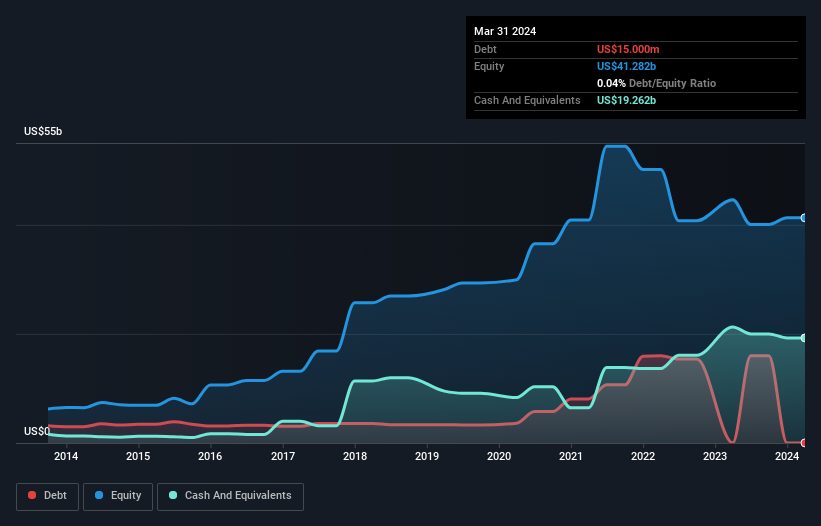Is Naspers (JSE:NPN) Using Debt Sensibly?

Warren Buffett famously said, 'Volatility is far from synonymous with risk.' When we think about how risky a company is, we always like to look at its use of debt, since debt overload can lead to ruin. We note that Naspers Limited (JSE:NPN) does have debt on its balance sheet. But is this debt a concern to shareholders?
Why Does Debt Bring Risk?
Debt and other liabilities become risky for a business when it cannot easily fulfill those obligations, either with free cash flow or by raising capital at an attractive price. If things get really bad, the lenders can take control of the business. However, a more common (but still painful) scenario is that it has to raise new equity capital at a low price, thus permanently diluting shareholders. Of course, debt can be an important tool in businesses, particularly capital heavy businesses. When we think about a company's use of debt, we first look at cash and debt together.
See our latest analysis for Naspers
What Is Naspers's Debt?
As you can see below, Naspers had US$15.0m of debt at March 2024, down from US$28.0m a year prior. However, its balance sheet shows it holds US$19.3b in cash, so it actually has US$19.2b net cash.

A Look At Naspers' Liabilities
We can see from the most recent balance sheet that Naspers had liabilities of US$4.81b falling due within a year, and liabilities of US$16.2b due beyond that. Offsetting this, it had US$19.3b in cash and US$1.74b in receivables that were due within 12 months. So its total liabilities are just about perfectly matched by its shorter-term, liquid assets.
Having regard to Naspers' size, it seems that its liquid assets are well balanced with its total liabilities. So while it's hard to imagine that the US$32.7b company is struggling for cash, we still think it's worth monitoring its balance sheet. Simply put, the fact that Naspers has more cash than debt is arguably a good indication that it can manage its debt safely. When analysing debt levels, the balance sheet is the obvious place to start. But it is future earnings, more than anything, that will determine Naspers's ability to maintain a healthy balance sheet going forward. So if you want to see what the professionals think, you might find this free report on analyst profit forecasts to be interesting.
Over 12 months, Naspers reported revenue of US$6.4b, which is a gain of 7.9%, although it did not report any earnings before interest and tax. We usually like to see faster growth from unprofitable companies, but each to their own.
So How Risky Is Naspers?
While Naspers lost money on an earnings before interest and tax (EBIT) level, it actually booked a paper profit of US$3.1b. So taking that on face value, and considering the cash, we don't think its very risky in the near term. We'll feel more comfortable with the stock once EBIT is positive, given the lacklustre revenue growth. There's no doubt that we learn most about debt from the balance sheet. However, not all investment risk resides within the balance sheet - far from it. We've identified 1 warning sign with Naspers , and understanding them should be part of your investment process.
Of course, if you're the type of investor who prefers buying stocks without the burden of debt, then don't hesitate to discover our exclusive list of net cash growth stocks, today.
Valuation is complex, but we're here to simplify it.
Discover if Naspers might be undervalued or overvalued with our detailed analysis, featuring fair value estimates, potential risks, dividends, insider trades, and its financial condition.
Access Free AnalysisHave feedback on this article? Concerned about the content? Get in touch with us directly. Alternatively, email editorial-team (at) simplywallst.com.
This article by Simply Wall St is general in nature. We provide commentary based on historical data and analyst forecasts only using an unbiased methodology and our articles are not intended to be financial advice. It does not constitute a recommendation to buy or sell any stock, and does not take account of your objectives, or your financial situation. We aim to bring you long-term focused analysis driven by fundamental data. Note that our analysis may not factor in the latest price-sensitive company announcements or qualitative material. Simply Wall St has no position in any stocks mentioned.
Have feedback on this article? Concerned about the content? Get in touch with us directly. Alternatively, email editorial-team@simplywallst.com
About JSE:NPN
Naspers
Operates in the consumer internet industry in Africa, Asia, Europe, Latin America, North America, and internationally.
Good value with proven track record.
Similar Companies
Market Insights
Community Narratives



